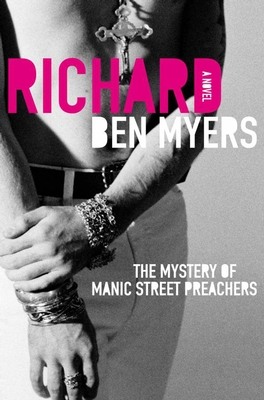Richard: The Mystery of the Manic Street Preachers by Ben Myers (Picador)
 In 1994, the Welsh rock band Manic Street Preachers released their third album, The Holy Bible. The cover featured a mock-religious triptych by Jenny Saville, depicting the body of an obese woman, but the title, chosen by a group who tried and failed to use Andres Serrano’s Piss Christ as the image for their first album, was chosen not so much for its blasphemy but, according to their lyricist, designer and “minister of information” Richey Edwards, because the book can be found “in every hotel room in the world”. The album’s subject matter was variously prostitution, depression, anorexia, Auschwitz, American imperialism, the commercialisation of revolt and an unambiguous advocacy of the death penalty.
In 1994, the Welsh rock band Manic Street Preachers released their third album, The Holy Bible. The cover featured a mock-religious triptych by Jenny Saville, depicting the body of an obese woman, but the title, chosen by a group who tried and failed to use Andres Serrano’s Piss Christ as the image for their first album, was chosen not so much for its blasphemy but, according to their lyricist, designer and “minister of information” Richey Edwards, because the book can be found “in every hotel room in the world”. The album’s subject matter was variously prostitution, depression, anorexia, Auschwitz, American imperialism, the commercialisation of revolt and an unambiguous advocacy of the death penalty.
It was an anti-humanist album, a horrifying statement by someone who clearly wants to believe in mankind’s capability for good but is unable to do so. The single “Faster” began with the binary declaration “I am an architect, they call me a butcher” and ended with the defeated refrain “Man kills everything”. This being rock music rather than literature, much time since has been spent pondering what this extraordinary work implied about Edwards’s mental health. The speculation is unsurprising, as in early 1995 his car was found by the Severn Bridge. He was declared “presumed dead” in 2008. Since then, his presence has loomed over the Manics, most recently in 2009’s Journal for Plague Lovers, based on lyrics written by Edwards in 1995, a series of cryptic and very funny texts on bodily horror, genetic engineering and asceticism.
Richard, meanwhile, is a novel by music journalist Ben Myers that tries with impressive gall to imagine Richey Edwards’s unwritten autobiography as he drifts around South Wales in February 1995. Myers is a sensitive, thoughtful writer, which prevents this book from being as ghoulish as it could so easily have been. His greatest skill is the atmospheric evocation of landscape and place, with much of the book set in meticulously described motorway edge zones, sterile hotels, sweaty tourbuses and, in the audacious climax, valleys and mountains; along with a knack for pop-cultural minutiae. Anyone who grew up reading the music press in the 1990s will have several involuntary cringes of recognition at much of the detail here, while the tragicomic ordinariness of Edwards’s upbringing is brought out with tact and dry humour.
Myers’s model is fairly obviously David Peace’s collages of the imaginary and real in his novels on Brian Clough, the Miners’ Strike and the Yorkshire Ripper, so it’s rather striking how, apart from the music-biz trudge Myers ruefully evokes, the outside world doesn’t impinge much on Richard’s mind. This imaginary autobiography is rather more self-pitying and solipsistic than The Holy Bible ever was. But on its own terms Richard is a brave, powerful, sometimes poignant, sometimes strained novel. What it does do, and well, is remind us of the intellectual passions and vaultingly ambitious plans that simmer unrecognised in small towns, and of how music, rather than academia, once provided the most immediate conduit for their realisation.

